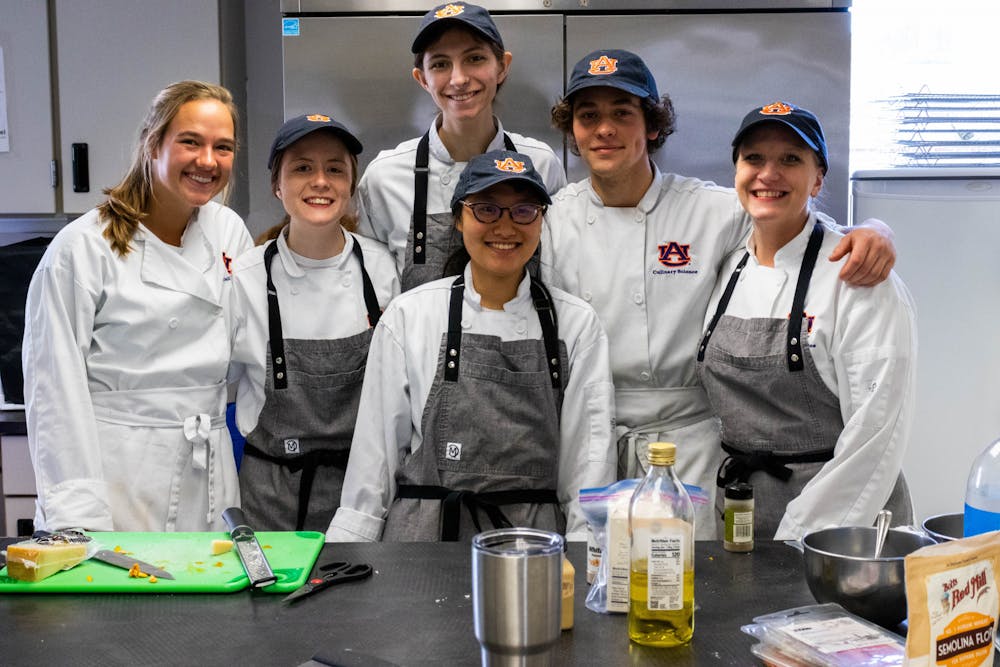Whether on or off campus, the hospitality scene in Auburn is vibrant with restaurants, families, and businesses that serve Auburn students and locals. Under the leadership of chefs such as David Bancroft of Acre, a recent Iron Chef Showdown Winner and James Beard Award semi-finalist, Auburn’s hospitality industry continues to attract culinary educators and leaders.
Auburn’s Hospitality Management Program is also keen on educating a new generation of culinary entrepreneurs as the program eagerly awaits the completion of the Tony and Libba Rane Culinary Science Building scheduled to open next fall. This building will enhance the resources of the college of human sciences and assist Auburn students to gain the necessary experience to be successful owners and innovators in the hospitality industry.
Master Culinologist Mark Traynor, Program Coordinator for the Culinary Science Program, shared how the new building will cater to the education of the students as well as contribute to the Auburn community at large.
“The building affords us the ability to focus on the more hands-on component of education. It will combine theory and practice,” Traynor said. “This building can also contribute to the Auburn people in the sense that it is to take care of people in a hospitable way, be that in our restaurants, in our spa, in our hotel, and in our event space.”
Traynor also shared the vision of the Hospitality Program and the key objectives of the curriculum.
“We are not just a hospitality program or a culinary program. We want our students whether it's hotels and restaurants or event management or culinary science to walk away and be the future leaders in the industry in their respective field of study,” Traynor said. “We want our students to be equipped to maybe potentially build a brand, build a business, or expand a business. We want our students to be innovators, leaders, and entrepreneurs.”
Jamari Collier, freshman in hospitality management, described his excitement for the new building and the opportunities different spaces will provide.
“I am most excited for the new teaching classrooms. We will be able to have many different teachers come in like different chefs from across the world and also locals like David Bancroft from Acre and Bow & Arrow,” Collier said. “It will provide us new opportunities to experiment and expound on different skills.”
In addition to the new kitchens, tasting rooms, and event spaces, The Culinary Science Building plans to introduce the Hey Day Market, which will facilitate eight to ten different commercial units with cutting edge food and an emphasis on sustainability. Traynor addressed one unique component.
“There is also going to be an incubation space in there,” Traynor said, “so if someone has a business idea and they want to test that out to the market, there will be a ready made facility there for somebody to test out their idea to the public and get feedback and be a stepping stone moving towards their own establishment.”
Whether it be an Auburn student or a member of the public, this incubation space will provide a unique opportunity for entrepreneurs and leaders to test their ideas. It's a space that will allow creative ventures to become tangible and accessible without long-term factors.
Beyond an industry and business, both Traynor and Collier speak to the uniqueness of hospitality in that it serves and connects people.
“It is to acknowledge people as actual people in the sense that they have a story and they have experiences behind themselves,” Traynor said. “There's a reason why in the hospitality industry we wouldn't necessarily say we have a customer, we have a guest because we are inviting them into our space and treating them as guests just as you would have someone come into your home. You have to have empathy.”
The impacts of the human touch, namely that it cultivates sympathy and promotes mutual helpfulness, are echoed in Collier’s description of bringing people together.
“One thing that food can do very well is that it can serve as a medium to bring people together and let them learn from one another,” Collier said. “Everyone is eating around a table and eating the same foods just talking about taste and discussing different ideas and exchanging those. It promotes a family atmosphere.”
Hospitality serves, connects, and creates spaces for stories to be told. It is a people oriented practice that caters to the needs of guests and cultivates environments where relationships can thrive. With the addition of the new Culinary Science Building, the hospitality industry will utilize its spaces to continue to serve the community and shape a new generation of knowledgeable, empathetic, and passionate culinary leaders.
Do you like this story? The Plainsman doesn't accept money from tuition or student fees, and we don't charge a subscription fee. But you can donate to support The Plainsman.





